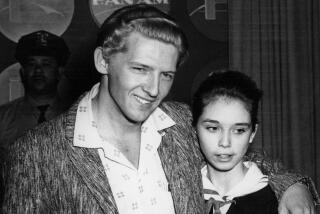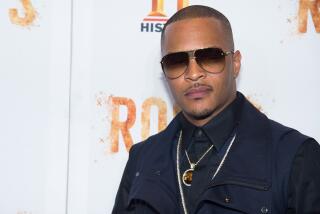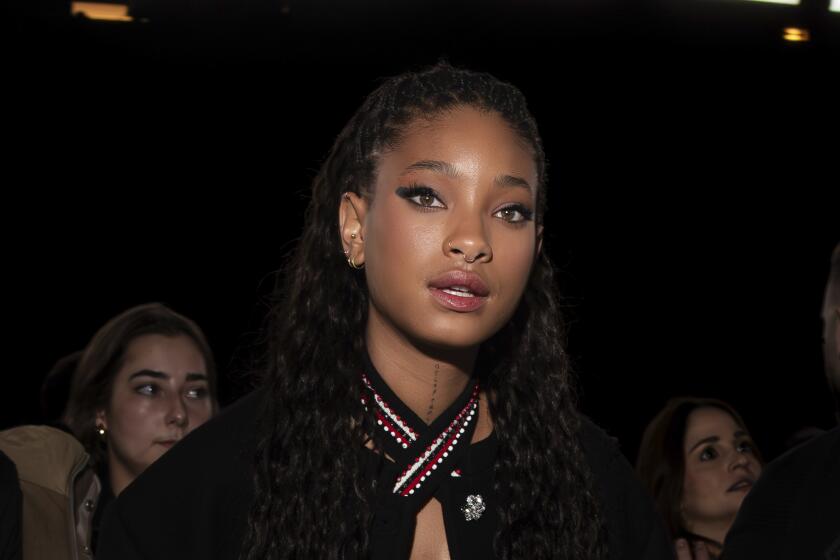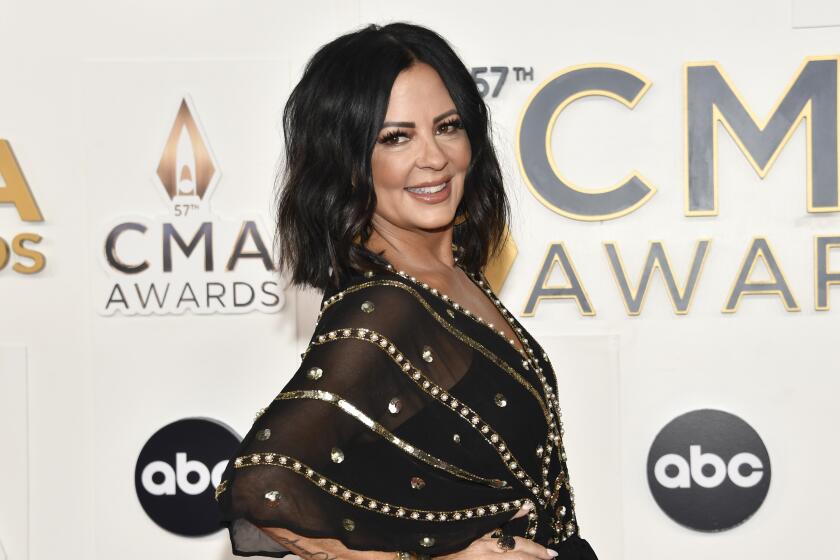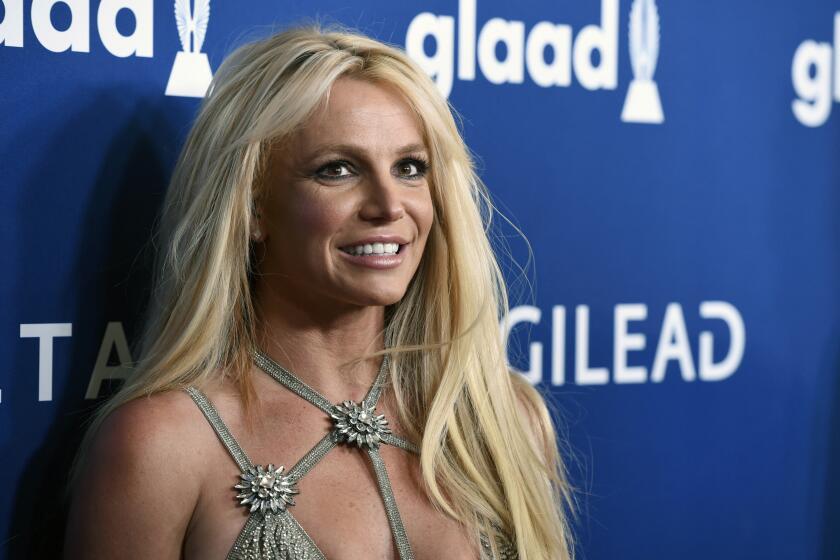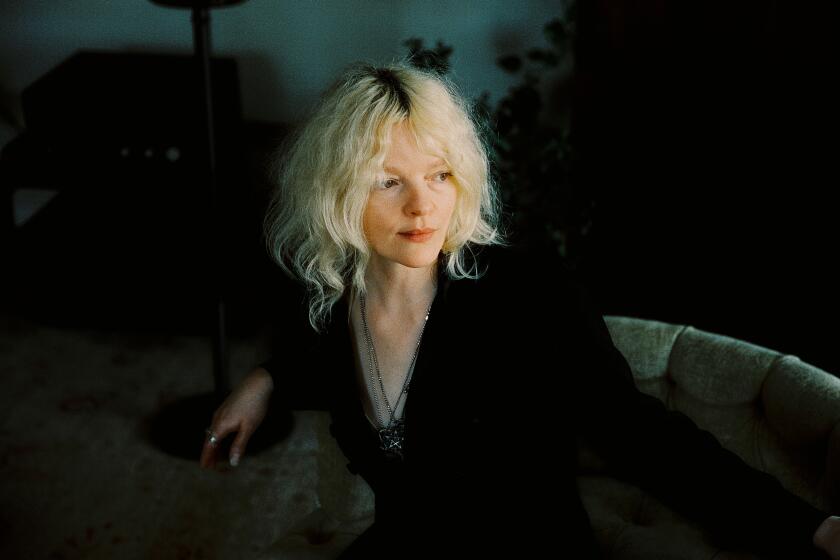POP MUSIC REVIEW : The Boss Plays for the ‘90s
Bruce Springsteen was so clearly a man on trial Friday night during his first extended public performance in nearly four years that he could well have brought a witness chair on stage with him.
The charges leveled in recent months against Springsteen, the most acclaimed figure in American rock in the ‘70s and ‘80s, have touched on everything from loss of commercial punch to lack of artistic relevance.
After all, the prosecutors would have a formidable case: Springsteen’s two latest albums have fallen out of the Top 30 after just a few weeks, and he’s no longer a young “working-class hero” from the darklands of New Jersey. He’s a 42-year-old family man from Beverly Hills.
Indeed, Springsteen is on the wrong side of the age, wealth and happiness curve in rock--and those are difficult stereotypes to battle.
Yet he knows that an artist’s defense is his work--and he offered a stirring defense during a dramatic 90-minute concert that was carried live on more than 200 radio stations around the country and in a bonus half-hour set for the 250 or so who attended the broadcast at a Hollywood sound stage.
Though he has a new band, Springsteen remained the masterful performer: purposeful material, an inspired sequencing of songs and--crucially--disarming humor.
He flashed some of that humor near the end of the radio segment when he closed “Glory Days,” one of his most inviting songs, with some of the good-natured horseplay associated with his shows during the years.
As if peering into a crystal ball, Springsteen, speaking in exaggerated tones, said he sees good times ahead--adventure, excitement and . . . “wait . . . wait . . . I see . . . the albums going back up the chart. . . . Yeah, they’re going up past . . . Def Leppard . . . Kris Kross . . . and Weird Al Yankovic . . . .”
It was at once a funny, disarming way of reflecting on the tension in the industry about Springsteen’s sales, but also a subtle slap at those who tend to measure the artistic value of the music by sales alone.
The concert, however, started off stiffly for both Springsteen and the new band, which has been expanded from the four-piece group unveiled last month on “Saturday Night Live” to include a guitarist-percussionist and five backup singers.
It made sense for Springsteen, after all this time away from touring, to reintroduce himself with “Born in the U.S.A.,” the song that did more than any other to establish him in the ‘80s as a cultural icon. And it made equal sense for him to quickly step away from that role--which he did by following the song with “Local Hero,” a wry, biting new tune about the myth-making process in America.
While the pairing worked ideologically, Springsteen and the band didn’t bring the music alive--victims of opening-night jitters.
“I missed ya,” Springsteen said to the audience after the second song, trying to break the ice, but the next two songs--the new “Lucky Town” and the old “Darkness at the Edge of Town”--still seemed a bit laborious and inconclusive.
The turning point was “If I Should Fall Behind,” a tender new song of devotion and commitment that he introduced by speaking about the changes in his own life, changes that include his marriage to singer Patti Scialfa and the birth of their two children.
“This song is about learning how to live with somebody, learning how to make the compromises and find the blessings those compromises bring,” said Springsteen, who then broadened the theme in a reference to the Los Angeles riots.
“This has been a real tough month here in Los Angeles, the kind of a month when the veil got pulled away and we got a chance to see how profoundly estranged from each other we really are.”
In the graceful, personal tone of the song, Springsteen found a comforting emotional base, and he began taking command on stage. He moved aggressively into “57 Channels (And Nothin’ On),” in part a slap at political rhetoric, and “The Big Muddy,” an especially angry look the nation’s lost ideals.
Against this backdrop of disillusionment, Springsteen offered “Living Proof,” a statement of optimism and hope that is one of the half-dozen best songs he’s ever written. If the transition was a bit too abrupt, the song itself--and his passionate delivery of it--was vintage, show-stopping Springsteen.
In all, Springsteen--who was joined at points in the show by longtime sidekick Little Steven and by Scialfa--did 15 songs during the radio show, plus another six for the studio audience. The final, post-radio sequence ranged from a wonderfully witty dialogue between the sexes in “99 1/2” to a surprisingly haunting solo acoustic version of “Dancing in the Dark.”
It’ll take time to see just how well the new band (which includes keyboardist Roy Bittan, drummer Zachary Alford, guitarist Shane Fontayne, bassist Tommy Sims and guitarist-percussionist Crystal Taliefaro) fits in, but the music continues to be colorful and full.
Springsteen has found a natural ally on stage in veteran R&B-gospel; singer Bobby King, who not only adds a nice soulful touch to harmonies but generates an engaging charisma.
As the title of the radio broadcast declared, Friday’s concert was a “Dress Rehearsal.” The formal tour won’t start until next Monday in Stockholm and won’t return to the United States until late July. That’s when we’ll begin to learn Springsteen’s place in the world of ‘90s rock.
But one thing is already apparent. Despite all the changes and all the time away, Springsteen’s spirit remains alive. Artistically, he’s still got that hungry heart.
More to Read
The biggest entertainment stories
Get our big stories about Hollywood, film, television, music, arts, culture and more right in your inbox as soon as they publish.
You may occasionally receive promotional content from the Los Angeles Times.

